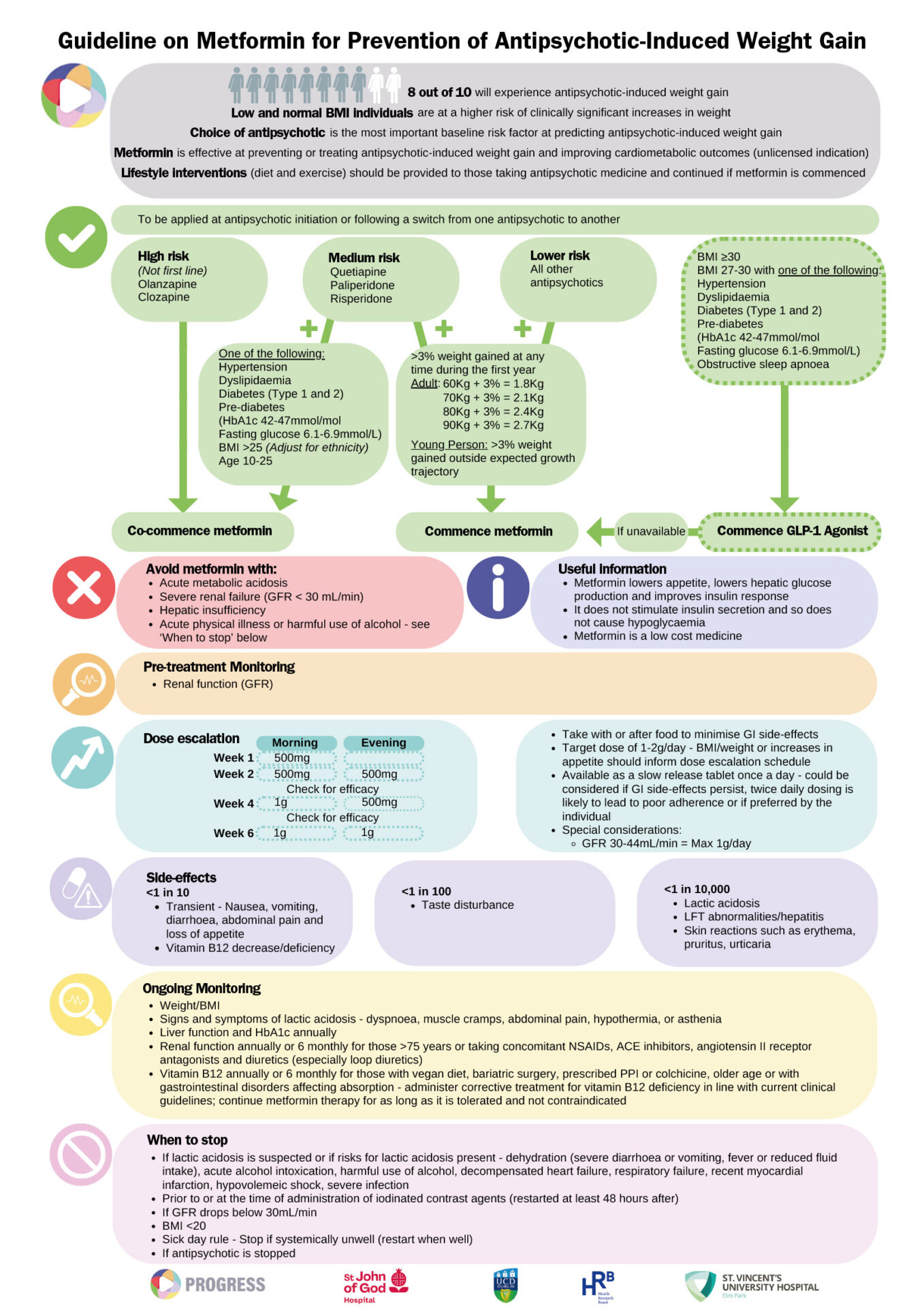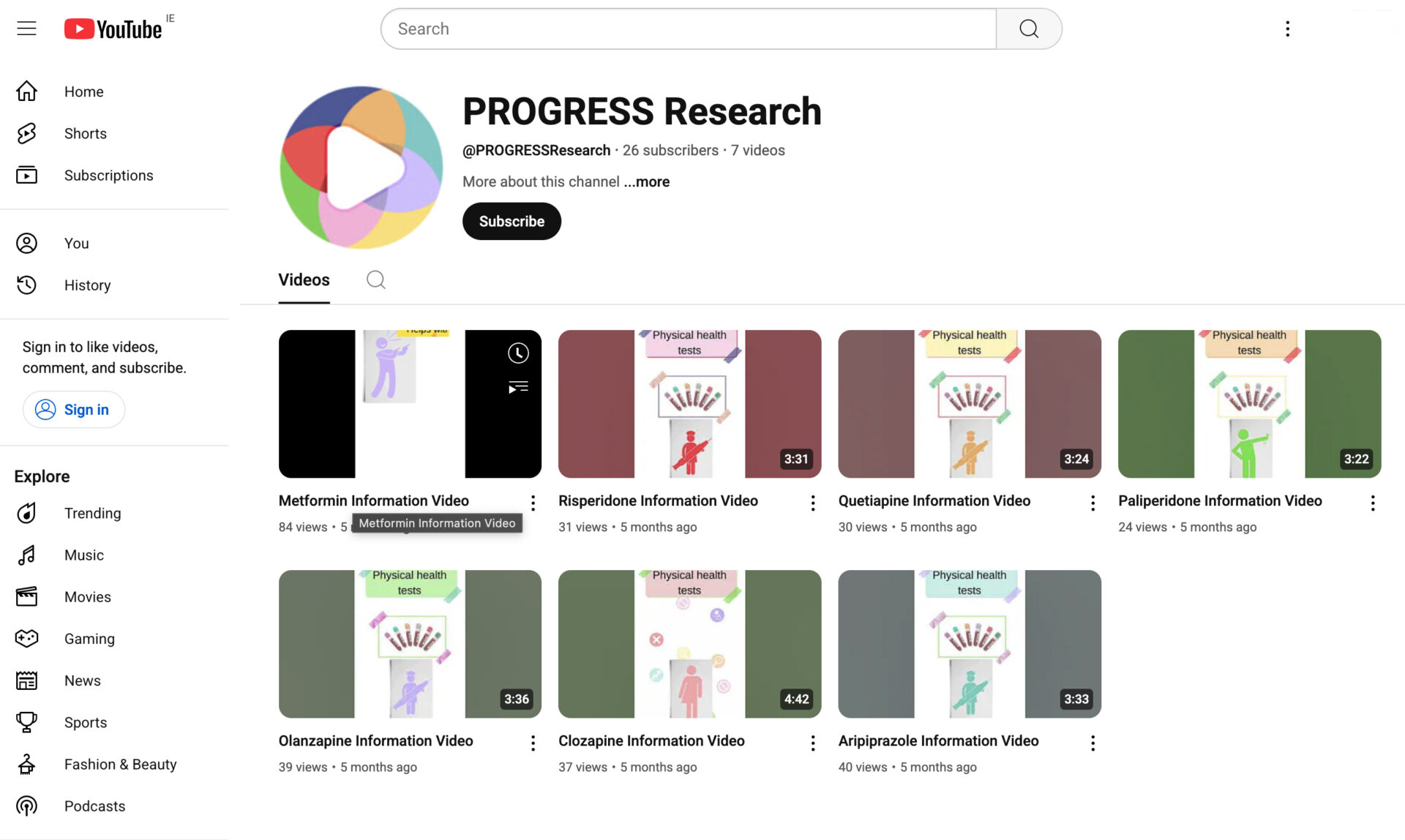Home » Metformin for the prevention of antipsychotic-induced weight gain

Researchers from the pharmacy team at St John of God University Hospital in collaboration with St Vincent’s University Hospital and University College Dublin worked with an international team of experts and people with lived experience to develop a new guideline for the use of metformin to prevent weight gain caused by antipsychotic medicines. The work is part of the PROGRESS research group led by Prof. Brian O’Donoghue, Professor of Psychiatry at UCD.
Overweight and obesity are highly prevalent in people with severe mental illness. Antipsychotic-induced weight gain (AIWG) is one of the most commonly reported and distressing side effects of treatment and people living with severe mental illness (SMI) place a high value on the avoidance of this side effect. Metformin is the most effective pharmacological intervention studied for the prevention of AIWG. Co-commencement of metformin with antipsychotic medicines can reduce the extent of weight gain by 4kg compared to controls. Yet, clear guidelines have been lacking, and evidence has not translated into practice.
The appraisal of guidelines for research and evaluation II instrument (AGREE II) was followed in developing the guideline. Literature was reviewed to address key health questions. The certainty of evidence was evaluated using GRADE methodology and an evidence-to-decision framework informed the strength of the recommendations. A consensus meeting was held at the Schizophrenia International Research Symposium in March 2024 where international experts agreed on the strength of recommendations. Independent external reviews were conducted involving those with expertise in the area of endocrinology, metabolic psychiatry, general practice, and patient and public partners.
Michael Norton, research administrator for patient and public involvement for the PROGRESS research group and collaborator on the guideline said: “It is vital that clinicians consider the physical effects of antipsychotic medications. This guideline encourages a holistic approach to treatment, ensuring service users receive comprehensive support in their recovery journey.”
The guideline, published in Schizophrenia Bulletin contains three core recommendations for co-commencement of metformin at initiation with an antipsychotic or commencement if certain criteria are present. For example, co-commencement is recommended with metabolically high-risk agents olanzapine and clozapine.

Metformin co-commencement is recommended for medium-risk antipsychotic medicines (risperidone, quetiapine, paliperidone) when other cardiometabolic co-morbidities are present. Metformin commencement is recommended for other medications when an individual gains >3 per cent of their pre-medication weight. These core recommendations were graded as strong by consensus agreement.

The one-page algorithm illustrates the core recommendations alongside key prescribing information to ensure that metformin prescribing is targeted at those most likely to benefit from metformin and that this is done safely with appropriate monitoring of dose, efficacy and side-effects.
Aoife Carolan, Advanced Specialist Pharmacist at Saint John of God Hospital said: “Weight gain as a side effect of antipsychotic medicines is something that we see in practice. This can be hugely distressing for people, but pharmacists are well placed in community and hospital to advocate for early intervention with medicines like metformin to prevent this distressing side effect.”
This is the first published evidence-based guideline using the AGREE II framework and GRADE methods for the use of metformin to prevent AIWG incorporating recommendations for co-commencement.
Implementation of the guideline is supported by a suite of videos that can support shared decision-making. The PROGRESS research YouTube channel can be accessed by members of the public and contains a metformin information video and other videos for psychotropic medicines. Pharmacists might find the videos useful in starting a discussion about weight gain with these medicines. The videos were co-designed with people with lived experience, carers and healthcare professionals and are designed to deliver key information about medication in a format that is accessible and inclusive.
Prof. Donal O’Shea, National Clinical Lead for Obesity said: “Obesity prevention is critical, and we now understand that medication plays a significant role in weight gain. These guidelines will help identify those most at risk and ensure timely intervention with metformin to mitigate this impact.”
Resources:
Schizophrenia Bulletin article: Available at academic.oup.com/schizophreniabulletin and search by article title, ‘Metformin for the Prevention of Antipsychotic-Induced Weight Gain: Guideline Development and Consensus Validation’.
YouTube Channel: youtube.com/@progressresearch
“Lifestyle interventions, such as diet and exercise, should be part of all management plans for individuals affected by severe mental illness. However, they are insufficient alone to prevent the weight gain that occurs after the initiation of antipsychotic medications, as this can be profound and occur rapidly. Hence, this is the rationale for using a medication such as metformin in a proactive manner, so that the weight gain can be prevented.” — Prof. Brian O’Donoghue
Aoife Carolan MSc MPharm MPSI

Advanced Specialist Pharmacist, Saint John of God Hospital
Highlighted Articles